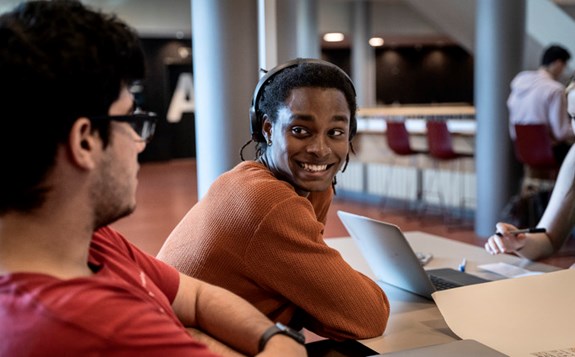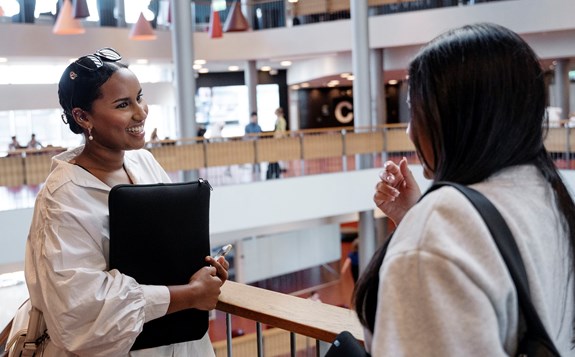We use cookies on this website. Cookies help us deliver the best experience on our website. Read about cookies.
-
- Education
- Education
- Programmes and courses
- Applications and admissions
- Tuition fees
- Scholarships
- Exchange studies at Malmö University
- Study Guidance
-
- After admission
- After admission
- Moving to Malmö
- Pre-orientation
- Arrival guide
-
- About studies at Malmö University
- About studies at Malmö University
- Why choose Malmö University
- Understanding university studies
- Connect with our students
On the page -
- Research
- Research
-
- Doctoral studies
- Doctoral studies
- Doctoral courses
-
- Doctoral schools
- Doctoral schools
- Adaptation of urban space through sustainable regeneration
- ComBine
- Culturally Empowering Education through Language and Literature
- Education, Learning and Globalisation
- Finding ways in a time of great future challenges (FinnFram)
- Swedish National Graduate School in Science and Technology Education Research
- Learning in Multicultural Societal Contexts
- Pedagogy and Vocational Skills
- Relevancing Mathematics and Science Education (RelMaS)
- Sustainable Movement Education
- The National Research School for Professionals in Social Services
- Research subjects
-
- Research centres
- Research centres
- Biofilms Research Centre for Biointerfaces
- Citizen Health
- Imagining and Co-Creating Futures
- Institute for Urban Research
- Malmö Institute for Migration Studies
- Literacy and Inclusive Teaching
- Centre for Work Life Studies
- Sustainable Digitalisation Research Centre
- Centre for Sexology and Sexuality Studies
-
- Research publications
- Research publications
- Search for research publications in Diva
- Malmö University Press
- Research events
- Participate in a research study
- Coffee Break Quiz
On the page -
- Collaboration and Innovation
- Collaboration and Innovation
-
- Levels of collaboration
- Levels of collaboration
-
- Local collaboration
- Local collaboration
- Muvah
- Co-Create Malmö
- Regional collaboration
- National collaboration
-
- International collaboration
- International collaboration
- UNIC
- Innovation
- Collaboration with students
-
- Collaborate with researchers
- Collaborate with researchers
- Labs and facilities
- Culture collaboration
- Support Malmö University
- Alumni & Friends
On the page -
- About us
- About us
-
- Faculties and departments
- Faculties and departments
-
- Faculty of Culture and Society
- Faculty of Culture and Society
- Department of Global Political Studies
- School of Arts and Communication
- Department of Urban Studies
-
- Faculty of Education and Society
- Faculty of Education and Society
- Department of Childhood, Education and Society
- Department of Sports Sciences
- Department of Culture, Languages and Media
- Department of Natural Science, Mathematics and Society
- Department of Society, Culture and Identity
- Department of School Development and Leadership
- The Centre for Teaching and Learning (CAKL)
-
- Faculty of Technology and Society
- Faculty of Technology and Society
- Department of Computer Science and Media Technology
- Department of Materials Science and Applied Mathematics
- Faculty of Odontology
- University Dental Clinic
-
- Find and contact Malmö University
- Find and contact Malmö University
- Visit Malmö University
-
- News and press
- News and press
- Graphic manual
- Map of the buildings (Google Maps)
- Merchandise
- Supplier information and invoice management
- Whistleblowing
- We will help you with your questions
- Management and decision-making paths
-
- Malmö University's strategy 2030
- Malmö University's strategy 2030
- Sustainability
- Widened recruitment and participation
- Quality assurance work at the University
-
- Malmö Academic Choir and Orchestra
- Malmö Academic Choir and Orchestra
- Student work – video pieces
-
- Annual Academic Celebration
- Annual Academic Celebration
- Academic traditions
- Meet our new professors
- Meet our new doctors
- Honorary doctors
-
- The University in a troubled world
- The University in a troubled world
- Campus total defence
On the page
Understanding university studies
university studies
This website explains terms that are good to know about university studies in Sweden and at the University. Learn the meaning of higher education credits, self-study, and distance learning. You can also find information about the grading system at the University.
Learning approach and self-study
The Swedish learning approach at university level is largely based around self-study. There might not be many classes each week, and students are expected to study independently between lectures. This requires students to do a lot of coursework independently or in groups, without direct supervision, and take responsibility for their own learning. Lectures and seminars are largely seen as a chance to reflect around the subject and students are expected to take an active part in the lecture.
Independent study
Most students at Malmö University study on campus, meaning that they regularly go to lectures and meet up for group work with their classmates. Some programmes give students the opportunity to study remotely, without regular face-to-face contact with teachers and fellow students. This allows a certain degree of flexibility but can also be demanding, as independent study requires self-motivation and the ability to manage time efficiently.
Higher education credits
Higher education credits are a standard used by universities to measure and assess students’ work and indicate the scope of an education. In Sweden, 60 credits correspond to one year of full-time academic study. Different parts of the world use different credit systems, and credits can sometimes be converted or transferred between these systems.
Courses can have different timeframes and different study-paces. The duration of a course depends on how many higher education credits are earned once the student has completed it. Some courses may run at a slower pace; for example, a part-time course that runs over two semesters.
Good to know about higher education credits
- 30 credits are equivalent to one semester of full-time studies
- 15 credits are equivalent to half a semester of full-time studies, or a full semester of part-time (50%) studies
- 7.5 credits are equivalent to one-quarter of a semester of full-time studies, or a full semester of part-time (25%) studies
Grading Systems at Malmö University
Malmö University uses a criterion-referenced grading system, not to be confused with the relative grading system as ECTS.
Most courses at Malmö University have a three-level grading scale: VG (Pass with Distinction), G (Pass), and U (Fail). A number of courses use only two grades: G (Pass) and U (Fail). Courses can also have grades awarded on a scale from A to E and U (Failed).
A= Excellent
B= Very Good
C= Good
D= Satisfactory
E= Pass
U= Failed
In order to receive a minimum passing grade = G (Pass) or E (Pass) the student has to meet all the learning outcomes of the course. In courses graded with A-U, a higher grade than E (Pass) require additional accomplishment. The learning outcomes are specified in each course’s syllabus, where the assessments and the grading scale of the course also are explained.
If credits from previous studies at other universities are counted within an education here at Malmö University, the transferred credits will be marked "Credited" in the degree certificate or "TG" in Ladok.
Grade Point Average
Please note that there is no national grading system in Sweden. The Swedish higher education institutions may determine freely which grading system is to be used for any of the courses on offer. Partly due to this variety of grading systems, no overall grade or GPA is given for a degree certificate and our graduate students are not ranked in any way.
There is also no officially determined methodology for translating the Swedish grades to any other foreign grading system. Ultimately, this is a question for the higher education institution that a graduate from Malmö University is applying to.
Programmes and courses
All programmes are made up of several courses. You can pick and choose any number of courses to study individually, or you can take a particular set of courses chronologically as part of a programme, resulting in either a bachelor's or master's degree.
Combining courses
You can choose to combine part-time courses so that they add up to full-time studies. Be sure to check both course dates and credits carefully to make sure the number of credits adds up to full-time studies. It is very important that you make sure that you do not, for example, choose two full-time 15 credit courses that run during the same dates.


